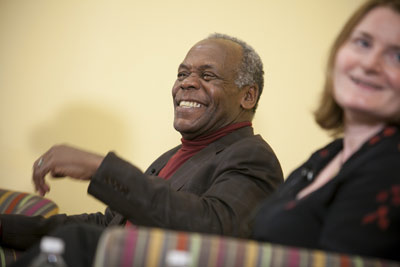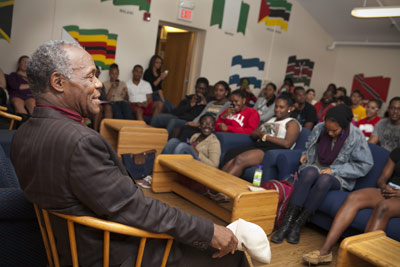Glover urges students to be 'architects' of their own 'rescue'
By Sarah Byrne


Labor rights activist and actor Danny Glover visited Cornell Sept. 25 to participate in events with students in ILR School classes, youth in Ithaca, residents of Ujamaa and the Africana Studies and Research Center for a panel titled "Race, Activism and Art: A Conversation With Danny Glover."
At the panel he noted that the ILR School was a case of "being on the right side of history." The ILR School was founded after World War II, when the United States began redefining its working middle class. At the same time, all over the world, the field of human rights was changing for the better, Glover said, with the development of the United Nations and decolonization.
Glover took questions from Noliwe Rooks, associate professor of Africana studies and of feminist, gender and sexuality studies; Sabine Haenni, associate professor of film and American studies; and Marc Bayard, executive director of ILR's Worker Institute.
"The best anti-poverty program is a union," Glover said, noting that since the 1940s, the unionized portion of the American workforce has declined from 40 percent to 12 percent. Glover sees this as one of our country's most important problems, and he emphasized the responsibility of employers to restore the power of unions. It's crucial that American companies create jobs that support a middle class rather than low-wage, part-time jobs, he said.
Glover said he was inspired to get involved with workers' rights by his parents' involvement in unions throughout his childhood. When he was growing up, he said, "racial demographics were changing ... the government job sector was desegregated," and both of his parents had job opportunities that were not available to the previous generation. As a student at San Francisco State University, Glover worked with the Black Student Union to bring about the university's College of Ethnic Studies.
As a well-known film star, Glover has the power to create projects he finds meaningful, including his most recent project, "Toussaint," about Toussaint L'Ouverture, who led a successful slave rebellion in the 18th century that sparked the Haitian revolution. Glover said that he aims to make films "not to give a history lesson, but to explore … more of a personal dynamic." He also helps fund ventures that can effect social change and "make it easier for filmmakers to tell their stories."
A self-described "citizen artist," Glover has been involved with activist movements in Hollywood as well, including protests against South African apartheid. As a celebrity, he says, he's free from the pressure politicians face to get re-elected and win public approval.
When asked for advice to student activists, Glover urged students to be the "architects of [their] own rescue." The choices we make define us, and college students are in the perfect position to make strong choices, Glover said. Student activism and community activism are one and the same; issues like labor rights and equality effect the whole country.
On Sept. 24 two Glover-produced films were shown in the Schwartz Center: "The Black Power Mixtape 1967-75" and "Bamako." Rooks and Haenni introduced the films.
Sarah Byrne '15 is a student intern for the Cornell Chronicle.
Media Contact
Get Cornell news delivered right to your inbox.
Subscribe